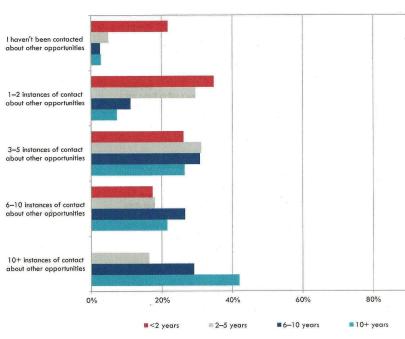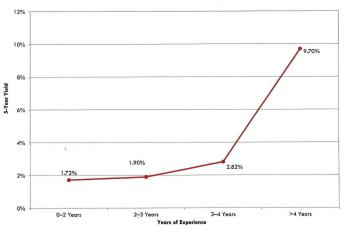 The rate of turnover among fundraisers remains high, and among no cohort of advancement professionals is this movement more pronounced than major gift officers (MGOs). Recent studies and surveys by CASE, AFP and others suggest the average tenure of a frontline fundraiser is now somewhere in the range of 2.4 to 3.5 years.
The rate of turnover among fundraisers remains high, and among no cohort of advancement professionals is this movement more pronounced than major gift officers (MGOs). Recent studies and surveys by CASE, AFP and others suggest the average tenure of a frontline fundraiser is now somewhere in the range of 2.4 to 3.5 years.
Whatever the actual tenure numbers may be, it’s obvious that a lot of major gift officers are on the move. And if you’re not already among them, it’s highly likely there will be attempts to convince you that you should be: A 2014 survey by our firm, Bentz Whaley Flessner (BWF), found that two-thirds of all frontline fundraisers with at least two years of major gift experience had received at least three recruiting contacts during the prior year, with a significant subset of that cohort receiving even more (see adjacent chart).
In other words, if you’re a major gift officer with even a smidgen of experience someone will try enticing you to move in 2015. My advice: Don’t do it.
 My rationale for dissuading you from changing jobs boils down to the proverb, “good things come to those who wait.” Frontline fundraisers who truly want to achieve success and produce transformational outcomes must be prepared to make an up-front investment of time—in their institutions, in their donors, and in themselves. Frequent moves do not serve you well, for several reasons:
My rationale for dissuading you from changing jobs boils down to the proverb, “good things come to those who wait.” Frontline fundraisers who truly want to achieve success and produce transformational outcomes must be prepared to make an up-front investment of time—in their institutions, in their donors, and in themselves. Frequent moves do not serve you well, for several reasons:
- Practice, Practice, Practice. The skills for effective cultivation, solicitation, negotiation and closing are only acquired through practice. Major gift fundraising is an art, and to become good at it requires training, repetition and lots of hands-on experience. Malcolm Gladwell, in his book Outliers, suggests that proficiency in any complex task is only achieved after 10,000 hours of practice. If we accept Gladwell’s rule and apply it to fundraising, we can project that a first-time gift officer will require almost five years to become effective at their work: 10,000 hours ÷ (40 hours x 52 weeks) = 4.8 years.
- Gladwell is Right. Additional research conducted by BWF on behalf of our clients confirms the validity of Gladwell’s proposition: When measuring the year-to-year progression of major gift officers’ productivity, it
 isn’t until their fourth year that fundraisers begin to generate significant output from their prospect portfolios. (See adjacent graph.) Once a gift officer turns that corner, their output continues to grow at substantial rates.
isn’t until their fourth year that fundraisers begin to generate significant output from their prospect portfolios. (See adjacent graph.) Once a gift officer turns that corner, their output continues to grow at substantial rates.
- Relationship-Building Requires… Relationships. BWF’s finding that gift officers require ramp-up time before generating significant returns from their portfolio should not be surprising. Major gift fundraising is a relationship-based endeavor, and relationships cannot be built overnight. While the most important relationships are always between the donor and the organization, the connection between a donor and a fundraiser is crucial. Only through a series of conversations and contacts can a gift officer come to understand a donor’s interests, capacity, motivations and readiness. And moving through that process requires the donor to have a substantial level of comfort with and trust in the fundraiser who is their principal contact. Frequent changes in fundraisers interrupts and delays the process—or even terminate it if a new gift officer doesn’t quickly pick up the ball again.
- Longevity Yields a Better Portfolio. Another reason it takes a few years for gift officers to begin tapping the capacity of their assigned prospects is that new fundraisers usually receive a “discovery” portfolio that will initially require numerous qualifying calls, many of which will result in prospects being dropped from consideration. Those dropped prospects will be replaced by others before this iterative process eventually
 develops for each fundraiser a solid collection of genuine major gift donors. Our firm’s experience is that it takes gift officers 2-4 years to transition a discovery-oriented portfolio into one that is weighted toward bona fide donor prospects and will begin to produce significantly greater gift income. Those who leave a position prematurely don’t get to harvest the fruits of their labors.
develops for each fundraiser a solid collection of genuine major gift donors. Our firm’s experience is that it takes gift officers 2-4 years to transition a discovery-oriented portfolio into one that is weighted toward bona fide donor prospects and will begin to produce significantly greater gift income. Those who leave a position prematurely don’t get to harvest the fruits of their labors.
- Fundraisers are Measured by Funds Raised. Because the demand for good fundraisers outstrips the available supply, it is possible to move from job to job over a short period of time. It’s also possible for a newbie to get lucky with one or two big gifts early in their tenure, and parlay that into another job. But in the final analysis, effective fundraising is all about building relationships and closing big gifts. If you cannot one day point to a single multi-year tenure during which you showed progressive growth and demonstrated your ability to close multiple large gifts, you will have fallen short of your full potential: You will have limited the philanthropic capacity of both the organizations you served and their donors, as well short-changed your own prospects for professional advancement and personal satisfaction.
- Results Get Rewarded. We all want to be rewarded for our work, and we can sometimes convince ourselves that by leaving our current employer we’ll find better rewards elsewhere. Nonetheless, even in our present day culture of immediate gratification, rewards still have to be earned, and the process of earning them takes time. As I suggested earlier, unless gift officers allow themselves adequate time to fully explore their portfolios, develop relationships and produce results, those earned rewards won’t be forthcoming. Our firm’s experience is that truly productive fundraisers are highly prized, and institutions will act within reason to retain them. But a gift officer can’t expect such VIP treatment unless they’ve earned it, and they definitely cannot earn it during a short tenure.
- Define Your Rewards and Go After Them. What are the rewards major gift officers want? Compensation, of course. But BWF’s 2014 survey of frontline fundraisers revealed that gift officers’ most desired rewards are actually not dollars but other less tangible items: A better prospect portfolio, professional development opportunities, information from and access to leadership, new challenges, and recognition. And you do have some control over these perquisites: Make a case to attend a workshop to
 develop a relevant new skill set. Suggest that you be involved in preparing a major solicitation. Ask to take on a new responsibility (that won’t interfere with your other duties). And above all else, challenge yourself to become more strategic and engaged with your own best prospects–and thus produce more gift dollars.
develop a relevant new skill set. Suggest that you be involved in preparing a major solicitation. Ask to take on a new responsibility (that won’t interfere with your other duties). And above all else, challenge yourself to become more strategic and engaged with your own best prospects–and thus produce more gift dollars.
- Everyone Loves a Winner. If you allow yourself to learn, develop and grow as a major gift officer, then positive results should follow. It’s at that point–where you can show that you are knowledgeable and skilled; that you have developed a productive prospect portfolio; and that you have also demonstrated staying power at one or more organizations–that you can write your own ticket. Fundraisers with such a record are truly in short supply, and if you can show that you’re one of them, both your current and other organizations will covet your services.
It’s true that your success is not entirely your own responsibility nor completely under your control, so I also offer two caveats to my admonition to stay put:
- Your organization and supervisor also have obligations to position you to achieve and sustain success as a fundraiser: you need training, coaching, resources, support and opportunity. And not every organization is as supportive as it should be. But rather than fret about what’s missing, take charge of your own progress as much as you possibly can–which may include finding coaches and mentors outside your current organization.
- There are sometimes reasons to leave an organization before you are able to establish the long-term track record I have suggested, such as a truly unreasonable supervisor, a toxic work environment, lack of professional development or growth opportunities, or an otherwise an unstable organization. But take to heart the familiar maxim, “the devil you know may be better than the one you don’t.”
 If you are a major gift officer considering a job change in 2015, be sure that you first conduct an honest self-assessment of whether you have done all that you can to become the seasoned, knowledgeable, productive and stable fundraiser that will be prized by your current and/or prospective organizations. And if you choose to leap, be sure you’re not doing it impulsively and that you have full knowledge of where you’ll be landing.
If you are a major gift officer considering a job change in 2015, be sure that you first conduct an honest self-assessment of whether you have done all that you can to become the seasoned, knowledgeable, productive and stable fundraiser that will be prized by your current and/or prospective organizations. And if you choose to leap, be sure you’re not doing it impulsively and that you have full knowledge of where you’ll be landing.
Otherwise, stay put. Instead, challenge yourself this year: make the most of your prospect portfolio, enhance critical skills, and take other actions that will increase your value. Make 2015 a year in which you, your organization and your future career prospects will become better, stronger, more productive, and well positioned for future success.
And continue following our blog, too: In subsequent posts we’ll be sharing additional insights into specific things you can do this year to enhance your performance, work more effectively with colleagues and supervisors, and position yourself for long-term success.

Pingback: Targeting Fundraising Talent | victornuovo.com
Pingback: Promotions That Increase the Attrition Risk of Your Team: Scenario A – The Unprepared Manager | Targeting Fundraising Talent